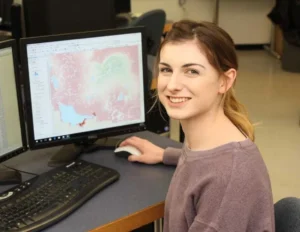An effective upskilling program has a lot of different moving parts. That is certainly true of the Programme de spécialisation en automatisation et agriculture numérique de Palette Skills. Since the launch of the pilot program in Saskatchewan only a little more than a year ago, over 50 participants have completed the 130 hours of rapid training and are now building great careers in agritech. Meanwhile, an entirely new cohort has been added to meet the demand for residents of Alberta.
The key to the program’s success lies in the close participation of industry, all the way from curriculum design to industry workshops, networking events, and hands-on learning experiences. Palette Skills recently sat down with Ednali Zehavi, the Automation and Digital Agriculture Specialist program manager, to find out more about what makes the program so successful.
Can you tell us about the Automation and Digital Agriculture Specialist program? When did it start? What kinds of gaps is the program trying to fill?
Ednali: The program was created because we knew there were gaps in the industry. In the agrifood industry we’ve seen tremendous growth in the last six years, with the implementation of new technology almost everywhere in the sector. You can call it automation, but it’s bigger than that, because it’s about the implementation of technology. From AI to machine learning to the Internet of things, we see all of these technologies now in areas such as processing, production, and distribution.
We knew there was a gap when it comes to the need for people who understand this technology, and who understand the needs of agriculture and agrifood business. This is the gap our program is trying to fill. Employers came to us about two years ago and they told us that they were trying to hire people with these kinds of technological skills, but there were problems with retention, and overall they were finding that training was taking too long. Some employers were taking people already in the industry and training them on tech, but for various reasons it wasn’t working. Employers were telling us that finding people who have the right backgrounds and training is like finding a unicorn.
So the program is all about finding unicorns! How does that work?
Ednali: We knew that we could identify people who are underemployed or even unemployed, who have a passion for agriculture, and who also have a lot of knowledge about implementing technology. What we found was that these people needed some specific training about the kinds of technological issues in different regions, and they needed to be connected to industry.
Right now we have two cohorts running, one in Saskatchewan and the other in Alberta. Both have been built with industry and for industry in the region. We are constantly in contact with the partners that we have, and they are providing not only feedback and helping develop curriculum, but also participating in workshops, and helping us understand their needs. Our industry partners are also bringing us real world data that our participants can work on and analyze. It’s exciting because each time we run the program, it’s different. And that’s because industry is telling us what they need.
Can you tell us a little bit more about the flow from finding the right people, to making sure they have the right skills?
Ednali: Because we’re constantly listening to industry, we know that right now the need for entry-level positions is saturated. We see that what is missing are those people with many years of experience, a high education, who are able to implement technology and who have a good understanding of agriculture. So these are the people we are marketing our program to.
The first stage is identifying the unique talents which are required, and that is an art all on its own. Then we start to work with different talent pools, letting people know about the program and inviting them to join. What’s really important is that we have a rigorous application process, where we are assessing not only experience and credentials, but whether people have the right attitude. What we want are people who have a passion for integrating into the industry, and taking it to the next level.
So it is a two month, very intensive program. It’s a lot of hands-on experience, so it’s not like a university course or degree. Instead we are working with industry leaders who are providing us with the case studies, who are providing us with the challenges that participants can start working on. And what we found is that as soon as our participants start the program, they engage with our employer partners. We developed the framework of this program with the cooperation of the University of Saskatchewan, but again, it’s not like a university program. Our students are getting to see the whole picture from a really practical level.

It sounds like one of the real strengths of the digital agriculture program are the opportunities for collaboration. Can you talk a little bit about that?
Ednali: One of the things we find is that when employers join up with our program and come to our events, not only do they get to see all of these great people, but they also get a better understanding of their own skills gaps. They knew they had gaps, but maybe they didn’t know how to articulate them. Another thing that’s really inspiring is when we bring together employers with participants, and employers start to talk about their challenges. And then something sparks with one of our participants, and they start to see solutions that they are bringing from their own experience. Our program brings people together so they can find solutions that right now are still not being solved properly in the industry, and that’s exciting.
To facilitate these kinds of collaborations, we’ve been working with Innovation Canada et Innovation Saskatchewan as well as with other partners. Together we created an innovation workshop and we call it Agriforward. From the third week of the program, participants are working on their own innovation ideas and concepts. At the end of the program we have a pitch night, where participants can pitch their ideas to industry, and what we’ve seen is that industry leaders are really taking to this and thinking about how they can implement some of these ideas.
Technology and agriculture is a huge field, with all kinds of different specializations and talent needs. Can you explain how the program is responding to these different demands?
We have three different streams in the program, and those streams are based on where we see the need. The first stream is about agribusiness, where we look for example for people with skills in management, marketing, business development, and law. The second stream is focused on developing industrial, technical, and professional skills. People with engineering skills, but also biologists, soil scientists, genomic experts, plant breeders and technicians are a good fit for this stream. The last stream is Data Analyst and Programmer, and it’s designed for people with experience in statistics, data collection and analysis, web and mobile applications development, software development, as well as programming.
In the beginning people were interested in using drones for everything. Now we know there are lots of areas where drones aren’t that useful, but what we do see is a real need for business management skills in agribusiness. So there is a need for people who can make business investment decisions in the right way, for example. More and more, industry needs people who can manage the integration of all the different areas in agriculture and technology. These are the emerging needs that are keeping employers awake at night, and that’s what we’re responding to in our program.
We know that the program is successful at matching talent with industry. Can you talk to us about how that happens?
Ednali: At the end of the program we go through a process of talent matching. We have an in-depth understanding of each of our partners and their needs, and we match them with talent, not just based on the particular skills that a person has, but also based on personality. Working in a corporate setting is a completely different environment than working with a start up, so those are the kinds of things we pay attention to.
One of the most important things to understand about the current labour gap is that part of it is due to the fact that sometimes, employers aren’t even really sure what kind of talent they need. Even if they do know about it, sometimes they aren’t able to put it in a job posting so that people know exactly what the needs are.
We work really hard on giving participants all the skills they need to connect with industry. So that’s about not just connecting with hiring managers, but also learning how to build networks. At this level, in mid-career and in management, finding a great position really comes through being able to build networks in your profession. We work with each participant to help them understand the right career path for them, given the different transferable skills they have.
These are not entry-level people, they’re not coming straight out of university. What they have are a lot of dreams about things they want to achieve. They really do have a burning fire, otherwise they wouldn’t be in the program. So we work with their passion, and we work with their transferable skills, and together we find the best way for them to contribute to the industry.
La programme spécialisé en automatisation et technologies numériques dans le secteur agricole
Are you interested in learning more about the Automation and Digital Agriculture Specialist program from Palette Skills? Maybe you are passionate about building a great career in digital and precision agriculture, or maybe you or your organization is building innovation in the agriculture sector right now. Either way, we want to hear from you! Find out more about the program by downloading the course guide, and learn how to connect with great new opportunities in agtech here.







